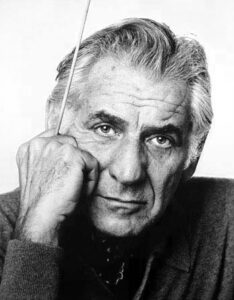By Mark D. Zimmerman

The trailer was released for the upcoming biopic Maestro about composer and conductor Leonard Bernstein. Controversy has arisen as a result of the choice of the non-Jewish actor Bradley Cooper to play the part of Bernstein, as well as his use of a prosthetic nose, which according to some critics injects the antisemitic trope of Jews having large noses. Others contend that actors should not be restricted to playing parts only of their own ethnicity, religion, or nationality. Bernstein’s children defended the choice of Cooper and his use of the prosthetic, noting that they were “touched to the core to witness the depth of (Cooper’s) commitment, his loving embrace of our father’s music and the sheer open-hearted joy he brought to his exploration” and that “It happens to be true that Leonard Bernstein had a nice, big nose. Bradley chose to use makeup to amplify his resemblance, and we’re perfectly fine with that. We’re also certain that our dad would have been fine with it as well.” Bernstein was the son of Jewish-Russian immigrants who raised him in Lawrence, Massachusetts. His early exposure to music included Friday night services at Congregation Mishkan Tefila in Roxbury, Massachusetts. Bernstein’s first symphonic composition was Jeremiah, with movements based on three aspects of the prophet’s life: Prophecy, Profanation, and Lamentation. The Broadway show West Side Story which he and choreographer Jerome Robbins created was originally planned to be about Jews and Catholics fighting in East Side Story. And he composed Chichester Psalms, the lyrics of which were in Hebrew, which was performed at the Vatican for Pope Paul VI’s 10th-anniversary of papacy. What is another example of Judaism infusing Bernstein’s professional life?
A. In 1945 Park Avenue Synagogue commissioned Bernstein to compose liturgy for their cantor to sing in the Shabbat morning service.

B. In 1963 Bernstein composed the symphony Kaddish, which he dedicated to victims of the Holocaust, inspired by the trial and hanging of Adolf Eichmann in 1962.
C. In 1974 Bernstein composed a ballet suite titled The Golem based on Saul Ansky’s Yiddish play of the same name. In Jewish lore, a golem is a clay creature that has been magically brought to life through Hebrew ritual incantations.
D. Composer Serge Koussevitzky told Bernstein he should change his name to Leonard S. Burns to avoid antisemitism but Bernstein decided not to do so.
E. Bernstein was hired to compose the music for the musical stage adaptation of Dickens’s Oliver Twist that became Oliver! But he withdrew, telling the producers that he found the large nose on the Jewish character Fagin to be offensive. However, Bernstein returned to the project after Fagin’s children issued a statement saying, “It happens to be true that Fagin had a nice, big nose.”
Link to answer: http://rrrjewishtrivia.com/answers-2023/leonard-bernstein-answer.html
*
Mark Zimmerman is the author of a series of Jewish trivia books, under the title RASHI, RAMBAM and RAMALAMADINGDONG: A Quizbook of Jewish Trivia Facts & Fun.
On the uproar about the false nose – other than to say the actor playing Bernstein seemed to possess a big enough nose of his own that would have sufficed – Has anyone thought of this from a different angle?
It’s only insulting if we let it be defined that way! Who dictated that a piffly little schnozel should be the gold standard? I don’t remember anyone saying Sophia Loren wasn’t stunningly beautiful with her prominent nose. Whilst no-one would say Miss Piggy was (except maybe Kermit).
Visit Israel and see the gorgeous girls, the handsome boys and guess what? Their noses are not often turned up or snub! And yes, they are good looking WITH, not in spite of, their more generous sized proboscis.